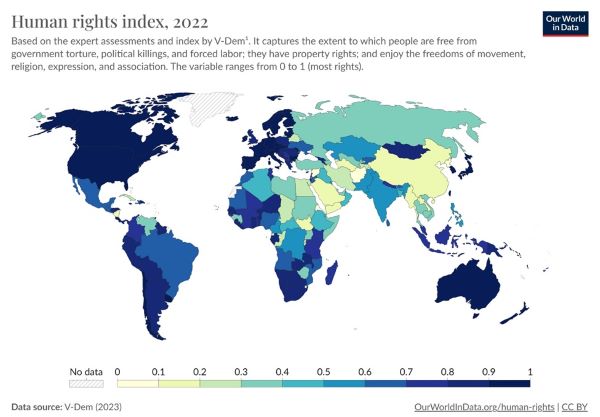Date : 12/12/2023
Relevance: GS Paper 2 – International Relations
Keywords: UDHR, Humanitarian Diplomacy, UNGA, WHO, SDGs, R2P
Context-
The Universal Declaration of Human Rights (UDHR), a cornerstone agreement safeguarding fundamental human rights, commemorates its 75th anniversary since adoption by the United Nations General Assembly in 1948. In the current global landscape, conflicts persist, leading to widespread human rights violations. This article explores the urgent need for a comprehensive strategy to uphold health as an essential human right in conflict zones, emphasizing a human rights approach and the multifaceted impact of armed conflicts on society, particularly health.
Human Rights Approach to Health in Conflict Zones:
The UDHR, comprising 30 articles, aimed to prevent atrocities witnessed during World War II and ensure the rights of every individual, irrespective of various factors. Figure 1 illustrates the extent of human rights violations in conflict zones globally, emphasizing the rising need to review existing frameworks. Ongoing conflicts in the Middle East and Europe showcase persistent violations, including wilful killings, sexual violence, and child deportation, necessitating global efforts to address human rights crises.
The escalation of armed conflicts correlates with increased human rights violations, particularly in Latin America, where human rights defenders face alarming risks. Restrictive laws by armed groups, notably in Yemen, Afghanistan, and Sudan, hinder humanitarian work, impacting the most vulnerable, especially children. The interconnected nature of conflicts and human rights violations underscores the need for a holistic approach to protect health as a fundamental human right.
Interlinkage of Human Rights and Health:
The interdependence of human rights and health is evident in the constitution of the World Health Organization (WHO), which recognizes health as a fundamental right extending beyond healthcare. However, civilians in conflict zones face limited access to healthcare, with a concerning trend of healthcare facilities and workers becoming targets (Figure 2). This highlights the imperative to view health as a fundamental human right to achieve UN Sustainable Development Goals (SDGs) 3 and 16, among others.
Overhauling Existing Mechanisms:
The UN has embraced various human rights resolutions, but their success relies on unified determination from states to implement and uphold them. Core instruments such as the Convention Against Torture, Declaration on Human Rights Defenders, Convention on the Rights of the Child, and Declaration on the Rights of Indigenous Peoples provide essential guidelines. However, a concerted effort is required to translate these into tangible actions.

The Responsibility to Protect (R2P) doctrine mandates global intervention to halt atrocities in conflict zones. Achieving a unified stance on R2P requires diplomatic engagements and persuasive tactics, especially with influential parties. Health diplomacy emerges as a tool in humanitarian crises to build resilient health systems, exemplified by the US medical mission and the BENAA Project in Egypt.
Diplomacy and Collaborative Tactics:
Diplomacy and persuasive tactics are essential for cultivating agreement and commitment to upholding human rights in conflict zones. R2P can be complex due to varying national interests, making diplomatic engagements crucial. Collaborative efforts involving influential neighboring states are vital for securing support for intervention measures. Protracted conflicts demand a combination of health diplomacy and humanitarian interventions to build resilient health systems and address the intricate interplay of health, peace, and conflict.
Enhancing Coordination and Humanitarian Diplomacy:
Enhancing coordination between global health, development, and aid providers through humanitarian diplomacy is critical for an effective overall response. Including health actors in working groups operating in conflict settings can strengthen disease surveillance, preparedness, and response. Mali's example, where the WHO and International Medical Corps led a health cluster, demonstrates the positive impact of such coordination.
Humanitarian diplomacy provides a space for discussion, decision-making, and cooperation, relieving suffering, ensuring livelihoods, and defending fundamental rights, including health. The inclusion of humanitarian workers during assessments leverages their knowledge for effective intervention strategies. Cooperation among multiple actors is imperative to navigate sovereignty issues, implement security protocols, and foster collaboration for sustained access, rebuilding activities, and nuanced political diplomacy.
Conclusion
Effectively upholding health as a fundamental human right in conflict zones demands a comprehensive strategy. This involves navigating sovereignty issues, implementing security protocols, and fostering collaboration among all parties involved. Post-conflict efforts must prioritize rebuilding medical facilities, training healthcare workers, and supporting the mental recovery of populations. Sustainable investments in resilient healthcare infrastructures are essential for lasting solutions beyond immediate health emergencies.
Critical evaluation of current policies and evidence-based actions reflecting socioeconomic and cultural contexts are imperative. Ongoing dialogues, such as the Pandemic treaty, play a crucial role in fortifying health systems and adopting new efficacious strategies. Achieving health as a fundamental human right requires concerted efforts, as reiterated by Dr. Tedros Adhanom Ghebreyesus, Director-General of the WHO. The complex challenges in conflict zones demand persistent commitment to human rights principles, diplomatic solutions, and collaborative actions to ensure a healthier and more secure future for all.
Probable Questions for UPSC mains Exam-
- Evaluate the effectiveness of the Responsibility to Protect (R2P) doctrine in addressing human rights violations during conflicts. How can diplomatic engagement and collaboration with influential parties contribute to achieving a unified stance on R2P, considering the inherent challenges in its implementation? (10 marks, 150 words)
- Examine the role of health diplomacy in responding to humanitarian crises, using examples of successful interventions. How does enhanced coordination among global health providers through humanitarian diplomacy aid in building resilient health systems in conflict settings? Provide instances from conflict zones, emphasizing the interconnected dynamics of health, peace, and conflict. (15 marks, 250 words)
Source- ORF







